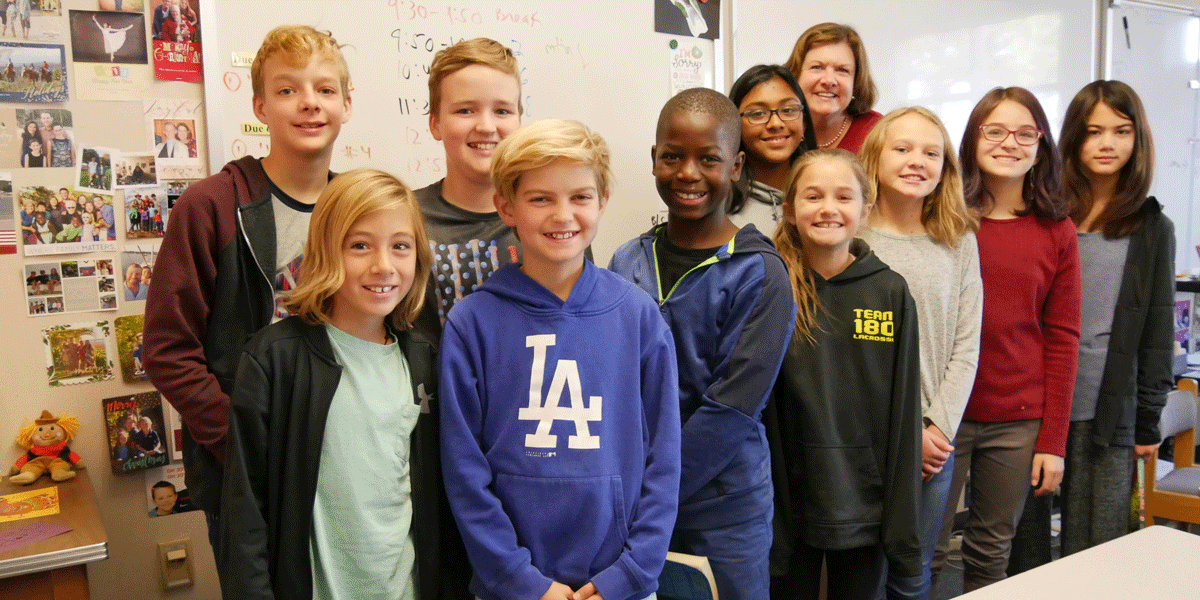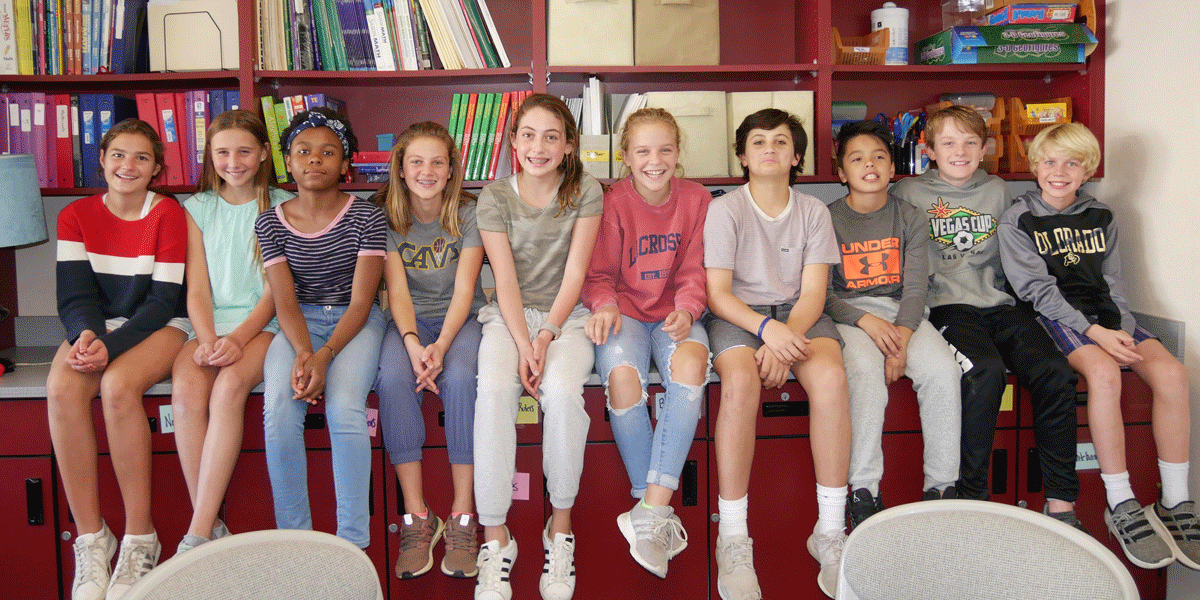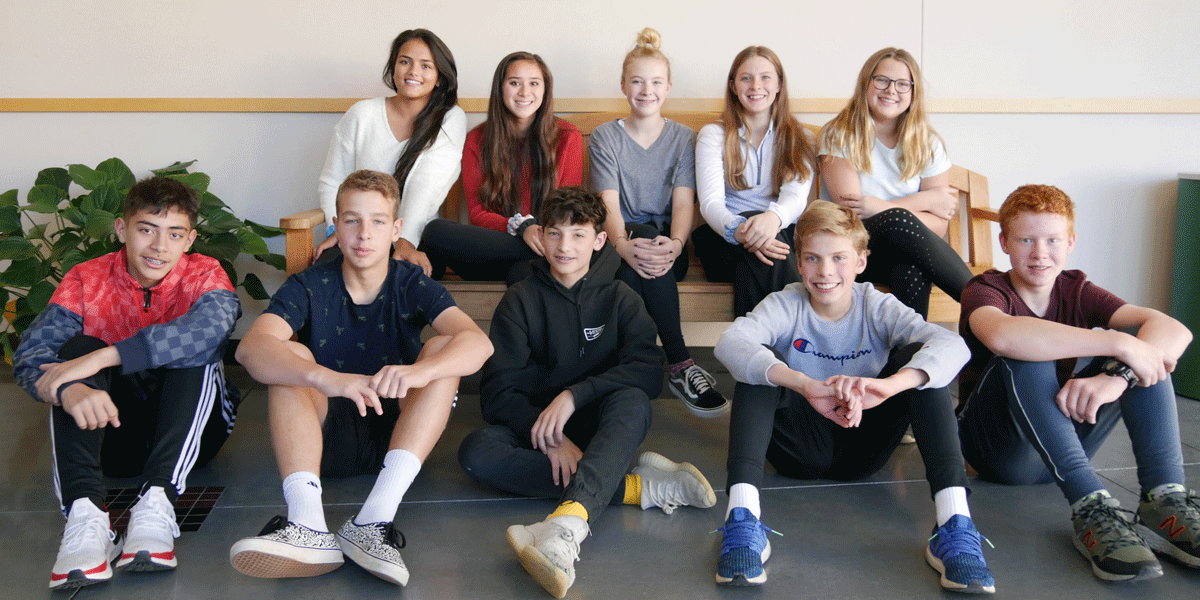It is Kameron Barthels’ birthday, and his Eighth Grade Advisory group, led by Colorado Academy Middle School English teacher Liz McIlravy, is celebrating. There is the traditional birthday snack, but before cookies, everyone in the Advisory takes time to truly celebrate what makes the birthday person special.
McIlravy gives students a series of prompts to inspire their writing.
“Kam, thank you for…” “You have a great way of…” “I have always admired…”I appreciate the way you…” “Wasn’t it great when we….” “In class, I have learned from you that….”
When everyone has finished, McIlravy reads the messages to Kam. Occasionally, he nods and smiles as he listens.
“Kam you are such a unique, cool, creative guy and incredibly good at building and taking things apart. You have a passion that not a lot of people have at this age, and it’s very inspirational.”
“I admire the way you are always so kind to everyone, no matter what.”
“I’m grateful for you always having a positive attitude.”
Birthday well-wishes ended, the Advisory digs into the cookies, and then begins an exercise called “Poetry Scramble.” The warm, light mood established during the birthday wishes exercise continues, as students work in teams to create impromptu poetry from random words.
“They wouldn’t say they are doing social and emotional learning, because it doesn’t feel forced,” McIlravy says. “And yet, that is exactly what is happening.”
On other days, the lesson may be more direct. “We’ve talked about bullying and about respecting people of different heritages,” says Eighth Grader Abe Kirkpatrick. “I feel like it’s opened my mind to different perspectives.”
How Advisory has changed
Colorado Academy Middle School Advisory has always been a place for a group of students to make close friends, engage with an adult who serves as an advocate for the student and a liaison with parents, and most important, have fun.
In 2019-2020, Advisory is still that, but more. This year, Middle School adopted a program developed by the Institute for Social and Emotional Learning (IFSEL), an organization with an international reputation. The curriculum focuses on five areas of learning: self-awareness, self-management, responsible decision-making, relationship skills, and social awareness.
CA believes these social and emotional competencies help promote a healthful school climate where students can succeed socially and academically, grow into leaders, learn to respect diversity, achieve, collaborate, and develop mindfulness. The many topics students might tackle include technology safety, healthy friendships, bullying and resolving conflicts, giving and receiving feedback, drugs and alcohol, and living with digital media.
“As students have become more adept at using technology for communication and interaction, they have less practice in face-to-face community building and problem solving,” says Middle School Principal Bill Wolf-Tinsman. “Developing those skills is every bit as important to long-term success as the academic challenges we provide.”

‘Lift-Up’ and ‘No-Joke Zone’ lists
The Advisory, comprised of 12-15 students, meets daily with an adult Advisor. Exercises may range from improvisation, group building, book reading and discussion, relaxation time, meditation, mindfulness, journal writing, and attending school assemblies. Students know that Mondays and Fridays focus on social and emotional learning. Advisories also meet a second time each day for study hall, so their Advisors can track both emotional and academic progress.
Starting the first day of school, Sixth Grade Advisor Peggy Butler has used a number of exercises to help her Advisory students build friendships. There is a “No-Joke Zone” list compiled by students, listing things people should avoid saying because they are not funny to others: “Making fun of my height.” “Talking about how I dress.” “Laughing and joking about something online and making fun of me for not knowing what it is.”
“It’s so important that from day one, they know what words might hurt someone else,” Butler says. “It’s been my experience that students often hold on to the comments they hear that first week, and that can impact their work in the classroom. If they feel safe and comfortable, that pays off in their classwork.”
The students have also built a “Lift-Up” list, to remind each other of behaviors that make them feel good: “When people laugh at my jokes.” “If someone waits for me.” “When I arrive at class, and someone says they are glad to see me.”
All Butler’s Advisory students have written 6-word “legacies” which are posted on the wall to help explain who they are:
“Bookworm, cellist, compromiser, learner, runner, writer”
“Athletic, funny, kind, smart, empathetic, loving”
The students also created and presented “Butler Bunch” posters with details about themselves, highlighting things people might not know about them. Within a short time after the beginning of the school year, this Advisory sees itself as a unit of supportive friends. “CA is a place where you get more than an education,” says Sixth Grader D Harris. “You also learn social skills.”
“Talking to others helps me work with people in groups,” adds Sloan Greenawalt. “You have to do that when you grow up, and so this is a perfect way to prepare you for life.”
Butler does all the same exercises she asks of her students as a way to “level the playing field.” A veteran teacher of 40 years, she has tried a variety of programs focused on social and emotional learning. “This is, by far, the best I have seen.” she says. “It’s authentic. It’s flexible. I’m so grateful we chose IFSEL, because this program really reaches students.”

Open Session
It’s Open Session Friday for Forbes Cone and Jessica Campbell’s Seventh Grade Advisory. The students are sitting in a circle with small pieces of yellow, red, and blue paper on their laps. They have already submitted comments that will be the subject of their discussion, indicating on the submission if they want to remain anonymous.
In front of them on the board is the code to the colors they hold: tossing a yellow piece of paper into the circle means the student is asking a clarifying question. Red stands for a comment that expresses empathy. Blue is wisdom. Cone and Campbell read their submitted comments and the students share their responses with the group. Some comments are marked “Joy.”
“I’m really looking forward to break to spend time with family and friends and catch up on sleep.”
But many of the comments express deeper concerns.
“I study a lot but I don’t always get the outcome I want.”
The responses from the group—clarifying questions, empathy, and wisdom—come quickly.
“You could go to your teacher during study hall and ask for help.”
“Do you spread out your studying or do you wait until the last minute?”
“I find that repetition helps me remember when I am studying.”
Another comment speaks to a common complaint from students.
“I feel like I am the only person who is stressed. It would help to know if someone else is.”
The group’s responses make it clear—whoever wrote this is not alone.
“I’m sorry that you feel that way. Try taking a deep breath and staying calm.”
“I’ve had 4 tests and homework this week. You just have to keep trying to get through it.”
“Stress is a natural thing, and it’s going to happen in Seventh Grade, so try to find something to do that helps you relax.”
While Open Session can lead to difficult discussions, Cone likes it, because the topics come from the students. “So often, we pick the topic, but this flips the script,” he says. “This is powerful, because they are choosing what they want to discuss and crowdsourcing wisdom for each other.”
Seventh Grader Coco Ardell agrees. “It’s good that people feel like they can open up to each other. We have a good community and we can trust each other.”
McIlravy praises the new curriculum focusing on social and emotional development, because it means the Advisory messages are consistent across the Middle School, with the potential for growth each year. Students are seeing this learning as equal in importance to their academics. And Cone points out that CA’s commitment to its mission is not being left to chance.
“In our Mission Statement, we espouse courage, kindness, leadership, but that doesn’t happen by osmosis,” Cone says. “With this program, we are intentional in addressing these skills and using the exercises to develop them.”
